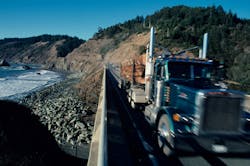New bill would permit 91,000-lb. rigs with extra axle
Pointing to productivity and safety benefits, Rep. Reid Ribble (R-WI) announced Thursday that he will introduce legislation to allow 91,000-lb., six-axle tractor-trailers on the federal interstate highway system.
The Safe, Flexible and Efficient Trucking Act (Safe Trucking Act) will be offered as an amendment to the surface transportation reauthorization, or highway bill, expected to be taken up in the House Transportation and Infrastructure Committee (T&I) next week.
Speaking on a teleconference with members of the news media, Ribble explained the extra axle would distribute the weight load and actually improve braking power, compared to a 5-axle rig at 80,000 pounds. And current infrastructure standards can support 91,000-lb., six-axle loads without additional “rehab costs” to Interstate bridges, based on a “deep dive on the data” in the recently released DOT truck size and weight study.
Additionally, he expects an increased weight limit on federal interstate highways would shift some truck traffic away from those state highways where higher limits are currently permitted.
“For me, it’s not just about productivity, but it’s the increased safety by having fewer trucks moving more product in a safer manner,” Ribble said. “Our roads are already heavily crowded. This 13% increase in capacity is heavily significant in moving more freight with fewer vehicles. This would also result in reduced fuel costs and CO2 emissions.”
He cited the immediate benefits to Wisconsin’s paper mills as an example of improved freight efficiency with heavier trucks.
Indeed, the congressman’s remarks were followed by representatives from a variety of industries that contend the truck weight increase would aid global competitiveness.
James Sembrot, senior director of transportation at Anheuser-Busch InBev, called the Safe Trucking Act “common sense policy that everybody can support,” and explained that his company ships more than a million truckloads of beer and raw materials each year—and many of those trailers are 60% empty due to the current weight restrictions. The 91,000-lb. limit would permit Anheuser-Busch to take 100,000 trucks a year off of the highway. He also estimated the cost of adding a sixth axle would be about $7,400 per trailer.
The Coalition for Transportation Productivity (CTP), a group of 200 manufacturers, shippers, carriers and allied associations whose primary aim is to support such legislation, organized the press conference.
“Truck travel has grown 22 times faster than road capacity since the federal weight limit was last changed in 1982,” said John Runyan, executive director of CTP. “Recognizing that more than 70 percent of freight must be shipped by truck, we need to confront the highway capacity crunch now if our country is to remain competitive. The Safe Trucking Act safely improves the productivity of truck shipments so we can decrease the truckloads necessary to meet demand and make our entire transportation network more efficient.”
That the 6-axle configuration is “bridge-formula compliant” and actually saves money on pavement restoration makes the bill “a game changer,” Runyan added. He also pointed out that the legislation would allow DOT to specify additional safety equipment for any trucks operating at the 91,000-lb. limit.
“They have the ability to make this a world-class truck for the movement of heavy goods, if they so choose,” Runyan said.
Politics could be tricky
Ribble explained that the bill will be offered as an amendment to the highway bill, noting that T&I Chairman Rep. Bill Shuster prefers the base legislation to be as “clean” as possible to garner bipartisan support. And Ribble conceded his bill will face opposition, both from the rail industry and some highway safety groups. But, he suggested, the 91,000-lb. limit should be more acceptable than previous attempts at a 97,000-lb. limit.
The Coalition Against Bigger Trucks has led the opposition on those previous attempts, but those efforts came under scrutiny earlier this year when a New York Times investigation revealed that the rail-backed group was paying law enforcement officers to lobby Washington legislators about potential dangers of longer and heavier trucks.
Still, his bill shouldn’t be about trucks vs. rail, Ribble noted.
Ribble also emphasized that his bill shouldn’t be confused with legislation that would increase twin-trailer length from 28 feet to 33 feet. Such legislation is attached to a pending bill to fund the DOT, and the trailer provision faced vocal opposition from Democrats in both the House and the Senate (where the rider made it out of committee by a single vote).
Supporters of the longer trailers have emphasized that the configuration is safe because the combination does not add any weight, while Ribble made the case the heavier trucks are safe because they are not longer, under his bill.
“We don’t touch the size of the trucks at all,” Ribble said. “Different groups and different organizations, whether for or against, will make their case as it relates to vehicle size, but I deliberately didn’t address it in this bill because I didn’t want to go down that rabbit trail.”
Still, the Coalition for Efficient & Responsible Trucking (CERT)—which backs longer trailers—on Thursday issued a notice to address the “misleading language” of the opposition, who are "doing everything possible to undermine proposals to make freight transportation safer and more efficient.”
CERT was responding to a recent CQ Roll Call report ("Ribble Bill Would Add Trucks' Weight to Debate on Length") in which a spokesman for the Advocates for Highway and Auto Safety “conflates” the separate issues of truck length and weight, and contends there’s a “significant overlap” in the membership of CERT and CTP—and “they all want bigger and heavier trucks.”
CERT rejected the claim, and said the two organizations do not share any common member companies.
And, to complicate matters, a lot of truckers don’t like the idea of heavier trucks, either. The Owner-Operator Independent Drivers Assn. (OOIDA) reiterated its objection Thursday, saying the 91,000-lb. limit doesn’t overcome the problems with 97,000-lb. rigs.
OOIDA Executive Vice President Todd Spencer called the proposal “a dumb idea on every level.” OOIDA contends the bill just provides an interim step to the higher limits, and that these limits are to benefit shippers and a just few large carriers.
Ribble said the T&I leadership would meet Friday to finalize a schedule for introducing its highway bill, with the tentative plan calling for a Thursday, Sept. 17 date for committee mark-up.
About the Author
Kevin Jones 1
Editor
Kevin has served as editor-in-chief of Trailer/Body Builders magazine since 2017—just the third editor in the magazine’s 60 years. He is also editorial director for Endeavor Business Media’s Commercial Vehicle group, which includes FleetOwner, Bulk Transporter, Refrigerated Transporter, American Trucker, and Fleet Maintenance magazines and websites.


